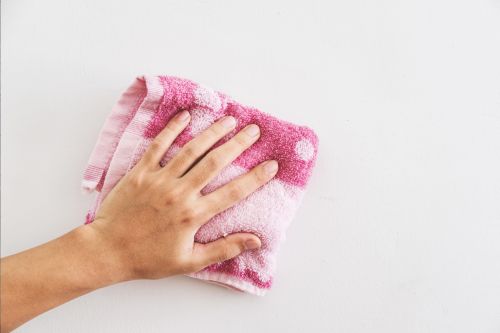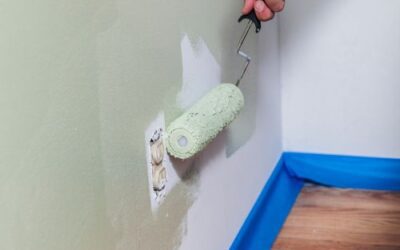Walls painted with washable paint are an excellent option for keeping your home clean and aesthetically pleasing. This type of paint is specifically designed to resist dirt and stains, making it the perfect choice for high-traffic areas such as kitchens, living rooms, hallways and even children’s rooms. However, although washable paint makes it easy to maintain, it is important to know how to clean it properly to avoid damage and keep it in perfect condition.
Benefits of washable paint
Before we get into the details of cleaning, it is important to understand why washable paint is such a practical and popular choice for homes.
Stain resistance
The main advantage of washable paint is that it is formulated to resist common household stains, such as fingerprints, food spills, or even accidental children’s art. Its ability to repel liquids and dirt means that stains do not penetrate the surface, making it easier to remove.
Durability
Another great benefit of washable paint is its durability. Unlike other types of paint that can quickly deteriorate with washing, washable paint retains its colour and texture even after several cleanings. This makes it an ideal choice for walls that require regular maintenance.
Versatility
Washable paint is not only durable, but also available in a wide range of colours and finishes, from matt to satin. This allows you to enjoy the aesthetics you like without worrying about cleaning and long-term maintenance.
Contact our professionals
Materials you will need to clean walls painted with washable paint
Before you start cleaning, make sure you have the right materials on hand to avoid damaging the paint. Abrasive or harsh products can damage the surface, so it is essential to use the following materials:
- Soft microfibre cloth
- Soft sponge
- lukewarm water
- Neutral soap or mild detergent
- Bucket
- Non-abrasive sponge
- Ladder or stool for access to high areas
With these items, you will be ready to effectively clean your walls without the risk of damaging them.
Steps to cleaning walls painted with washable paint
Now that you have everything you need, it’s time to start the cleaning process. Here’s how to do it step by step.
Step 1: Remove surface dust
Before applying any type of cleaner, it is important to remove the dust from the wall. Use a dry microfibre cloth or soft broom to remove surface dust and dirt. Start from the top of the wall and work downwards, to avoid dust falling onto areas that have already been cleaned.
This step is crucial, as any dust left on the surface can cause scratches when you start cleaning with water or cleaning products.
Step 2: Prepare the cleaning solution
In a bucket, mix warm water with a few drops of neutral soap or mild detergent. Be sure not to use too much soap, as too much can leave residue on the wall. The warm water helps to break down dirt more easily, while the neutral soap avoids damaging the paint finish.
It is important not to use abrasives or harsh chemical cleaners, as they may affect the colour or texture of the washable paint.
Step 3: Wipe the wall with gentle strokes
Dampen a sponge or soft cloth in the cleaning solution you have prepared. Wring out the cloth or sponge well so that it is not too wet, as too much water can damage the paint or leave water marks on the surface.
Start wiping the wall with gentle, circular movements, paying special attention to stains or areas with accumulated dirt. Do not scrub too hard, as this may abrade the paint or cause the colour to shift.
Step 4: Rinse and dry the wall
Once you have cleaned the entire wall, it is important to rinse it to remove any remaining soap residue. To do this, use a clean cloth dampened with water only. Go over the entire wall again, making sure to remove any traces of the cleaning solution.
Finally, dry the wall with a clean, dry cloth. If the wall is left to air dry, water marks may remain, especially on satin or gloss finish paints. Therefore, drying the wall by hand is a good practice to ensure that the wall is spotless.
Tips for keeping walls spotless
In addition to following the steps above, there are some additional tips you can keep in mind to keep your walls painted with washable paint always clean and in good condition.
Regular cleaning
Although washable paint makes it easy to remove stains, it is advisable to do a light cleaning of the walls on a regular basis, at least once a month. This helps to prevent dirt build-up and makes stains easier to remove.
Treatment of specific stains
For more stubborn stains, such as pen marks or grease stains, you can use a solution of warm water and baking soda. Mix a small amount of baking soda with water to form a paste, apply it to the stain with a soft cloth and rinse with clean water.
Avoid using abrasive products
Avoid using hard brushes or abrasive sponges, as they can scratch or deteriorate the paint finish. Also, be sure to test any cleaner on a small inconspicuous area before using it on the entire wall, to ensure that it will not affect the colour or texture of the paint.
At Bartolomé Bas Pintores, we use high quality washable paint to ensure that your walls not only look impeccable, but are also easy to maintain. Our team of professionals guarantees a durable and resistant finish, ideal for any space in your home. If you’re looking to renovate your house paint with a practical and modern option, trust us to deliver the best results.
Other publications that may interest you
Paint suitable for basements and poorly ventilated rooms
Basements, storerooms or garages have unique conditions: poor ventilation, high humidity and increased risk of mould or condensation. Using conventional paint in these spaces is a common mistake that leads to ephemeral finishes and health problems due to fungi or...
How often should a house be painted depending on its use?
The frequency with which you should paint a house is not always the same. It depends on several factors: the use given to each room, the quality of the paint used, exposure to light or humidity, and even the colour. In this guide we explain how often you should renew...
Tips for painting a room without staining doors and sockets
Painting a room may seem like a simple task, but without the right preparation it's easy to end up with splashes on doors, sockets, switches and even skirting boards. If you want a clean, professional finish, we've got the best tips to avoid stains and save you...




